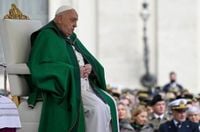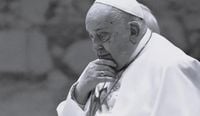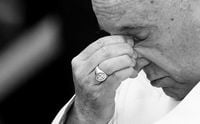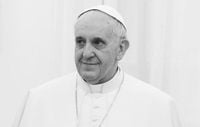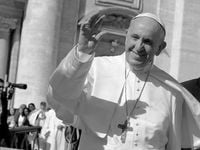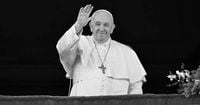Pope Francis has passed away at the age of 88, as announced by the Vatican on April 21, 2025. Cardinal Kevin Farrell, the Camerlengo of the Holy Roman Church, conveyed the news from the chapel of Domus Sanctae Marthae, stating, "Dear brothers and sisters, with deep sorrow I must announce the death of our Holy Father Francis. At 7:35 this morning, the Bishop of Rome, Francis, returned to the Father’s house." His life was dedicated to serving God and His Church, promoting the values of the Gospel with faithfulness, courage, and universal love, especially towards the poor and marginalized.
Pope Francis, born Jorge Mario Bergoglio on December 17, 1936, in Buenos Aires, Argentina, made history as the first pope from South America. His journey to the papacy began when he entered the Society of Jesus on March 11, 1958, where he pursued studies in humanities in Chile and later philosophy in Argentina. He was ordained a priest on December 13, 1969, and took his final vows in the Jesuit order on April 22, 1973.
His rise within the Church was marked by significant appointments. On May 20, 1992, he was appointed auxiliary bishop of Buenos Aires by Pope John Paul II, and he became a cardinal in February 2001. Following the death of Pope John Paul II, Bergoglio participated in the conclave that elected Pope Benedict XVI in April 2005. However, it was in March 2013 that he was elected the 266th pope of the Catholic Church, taking the name Francis, in honor of Saint Francis of Assisi.
During his 12-year pontificate, Pope Francis was known for his humility and commitment to social justice. He often emphasized the importance of caring for the vulnerable and marginalized. His papacy was characterized by a series of reforms aimed at modernizing the Church and making it more accessible to the faithful. He convened ten ordinary consistories, creating 163 cardinals and canonizing numerous saints, including two of his predecessors, Paul VI and John Paul I.
In the weeks leading up to his death, Pope Francis faced significant health challenges. On February 14, 2025, he was admitted to the Gemelli Hospital due to severe bronchitis. His condition worsened, leading to a diagnosis of pneumonia and requiring blood transfusions. Although he was discharged on March 23, 2025, his health remained a concern. He made a brief appearance on the balcony of the Vatican on April 20, 2025, during the Urbi et Orbi blessing, where he managed to speak a few words to the gathered faithful.
His death marks a significant moment in the history of the Catholic Church. Cardinal Farrell expressed gratitude for Pope Francis's example as a true disciple of Jesus, stating, "With immense gratitude for his example as a true disciple of the Lord Jesus, we commend the soul of Pope Francis to the infinite merciful love of the One God." The Vatican is expected to announce funeral arrangements soon, as the world mourns the loss of a leader who dedicated his life to faith and service.
Pope Francis's legacy includes a strong emphasis on interfaith dialogue, environmental issues, and a pastoral approach that sought to bridge gaps within the Church and society. His teachings often highlighted the need for compassion and understanding in a world divided by conflict and inequality. The pope's commitment to addressing climate change and advocating for peace in regions affected by violence will be remembered as hallmarks of his papacy.
As the Church prepares for the next conclave, many will reflect on the profound impact of Pope Francis's leadership. His ability to connect with people from all walks of life and his unwavering dedication to the principles of the Gospel will continue to inspire future generations.
In the days to come, tributes and remembrances will pour in from around the globe, as leaders, faithful, and individuals alike honor the life and contributions of Pope Francis. His vision for a more inclusive and compassionate Church will be a guiding light as the Catholic community navigates the future.
